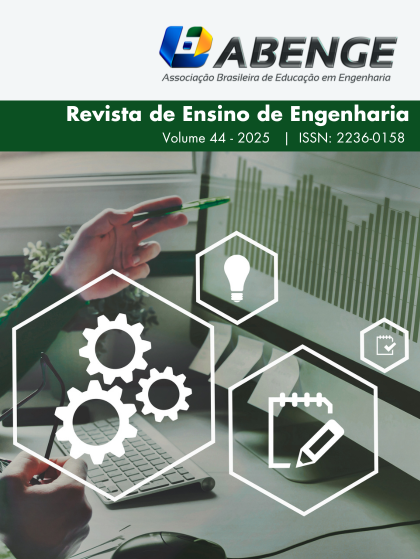PRÁTICAS PEDAGÓGICAS E FORMAÇÃO DOCENTE PARA INCLUSÃO: UMA ANÁLISE ESTRUTURADA COM O MÉTODO AHP
Palabras clave:
formação de professores, ensino superior, educação inclusiva, neurodivergênciaResumen
A inclusão de estudantes neurodivergentes no Ensino Superior enfrenta desafios significativos, especialmente relacionados à capacitação docente, frequentemente insuficiente para atender às demandas específicas desse público. Este estudo analisou as principais demandas dos professores e as estratégias pedagógicas voltadas à promoção de uma inclusão acadêmica eficaz, utilizando o método Analytic Hierarchy Process (AHP) para priorizar práticas pedagógicas identificadas na literatura. A análise contemplou artigos que abordam a gamificação como técnica de aprendizagem e a formação de professores para a educação inclusiva. Os resultados destacaram a gamificação como uma abordagem dinâmica, de forte engajamento e adaptável às necessidades dos estudantes, além de reforçarem a importância da formação continuada dos docentes. O estudo conclui que práticas pedagógicas inclusivas podem ser aplicadas de forma eficaz no Ensino Superior, beneficiando tanto estudantes neurodivergentes quanto neurotípicos.
Referencias
AMERICAN PSYCHIATRIC ASSOCIATION. Diagnostic and statistical manual of mental disorders (DSM-5). 5. ed. Arlington: APA, 2014.
ARMSTRONG, T. Neurodiversity: discovering the extraordinary gifts of autism, ADHD, dyslexia, and other brain differences. Boston: Da Capo Lifelong Books, 2017.
ARRUDA, D.; CASTANHO, E. Formação de professores e inclusão: desafios e perspectivas. Revista Brasileira de Educação, v. 20, n. 62, p. 123-142, 2015.
CHOEZ, M. et al. Gamificação como recurso para engajamento de estudantes neurodivergentes. Revista de Ensino e Tecnologia Educacional, v. 12, n. 1, p. 55-71, 2023.
GOOGLE ACADÊMICO. Disponível em: https://scholar.google.com. Acesso em: 15 out. 2024.
LOPES, S. V. et al. A influência do capacitismo no Decreto n° 10.502/2020 e no texto da Política Nacional de Educação Especial (PNEE) 2020. Educação e Pesquisa, São Paulo, v. 49, n. 1, p. 679-692, jan./mar. 2023.
MARCILIO, C.; CHOEZ, M. Tecnologias digitais e metodologias ativas no ensino inclusivo. Revista Brasileira de Educação Especial, v. 29, n. 2, p. 200-218, 2023.
MEC. Ministério da Educação (Brasil). Censo da educação superior 2013-2023. Brasília: MEC, 2024. Disponível em: http://portal.inep.gov.br. Acesso em: 15 out. 2024.
MEC. Ministério da Educação (Brasil). Política nacional de educação especial na perspectiva da educação inclusiva. Brasília: MEC, 2008. Disponível em: http://portal.mec.gov.br. Acesso em: 15 out. 2024.
MORAN, J. Metodologias ativas para uma aprendizagem mais profunda. In: BACICH, L.; MORAN, J. (org.). Metodologias ativas para uma educação inovadora: uma abordagem teórico-prática. Porto Alegre: Penso, 2018.
PORTAL DE PERIÓDICOS CAPES. Disponível em: https://www.periodicos.capes.gov.br. Acesso em: 15 out. 2024.
SAATY, T. L. The analytic hierarchy process: planning, priority setting, resource allocation. New York: McGraw-Hill, 1980.
SANTOS, J. M. O.; LIMA, P. G. A formação de professores e a educação inclusiva: discussão acerca do tema. Revista Docent Discunt, Engenheiro Coelho, SP, v. 1, n. 1, p. 63-70, 2. sem. 2020.
SANTOS, R.; OLIVEIRA, C. Neurodivergência e estratégias pedagógicas inclusivas no ensino superior. Educação e Pesquisa, v. 45, n. 3, p. 875-892, 2019.
SCIELO. Scientific Electronic Library Online. Disponível em: https://www.scielo.org. Acesso em: 15 out. 2024.
SINGER, J. Neurodiversity: the birth of an idea. Adelaide: Disability Studies, 1999.
SINGER, J. Why can’t you be normal for once in your life? From a “problem with no name” to the emergence of a new category of difference. In: SHAKESPEARE, T. (ed.). Disability discourse. London: Continuum, 1999.
TAYLOR, L. et al. Cognitive strengths in neurodivergent individuals. In: ARMSTRONG, T. (Org.). Neurodiversity in education and work. New York: Routledge, 2020.
WALKER, N.; RAYMAKER, D. M. Toward a neuroqueer future: an interview with Nick Walker. Autism in Adulthood, v. 3, n. 1, p. 5-10, 1 mar. 2021.


